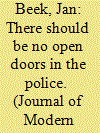|
|
|
Sort Order |
|
|
|
Items / Page
|
|
|
|
|
|
|
| Srl | Item |
| 1 |
ID:
120917


|
|
|
|
|
| Publication |
2013.
|
| Summary/Abstract |
This article critically reflects on what impact a supported and formalized artisanal and small-scale mining (ASM) sector could have in Northern Ghana, where poverty is deeply rooted, the outcome of decades of government neglect. Since independence in 1957, numerous attempts have been made to improve the living standards of the populations in the country's North but deteriorated human resource bases and shortages of infrastructure have limited their effectiveness. A recent upsurge in ASM activity, however, has catapulted the region on to another - previously unimaginable - growth trajectory entirely. As findings from research carried out in the township of Kui in Bole District of the country's Northern Region illustrate, ASM has injected considerable wealth into many of Ghana's Northern localities, in the process helping to stabilise their economies and alleviate the hardships of tens of thousands of farm-dependent families. The intensification of support to, and the formalisation of, ASM, could prove to be an important step toward eradicating a poverty problem that has plagued this region of sub-Saharan Africa for more than a century.
|
|
|
|
|
|
|
|
|
|
|
|
|
|
|
|
| 2 |
ID:
185834


|
|
|
|
|
| Summary/Abstract |
Social media misinformation is widely recognized as a significant and growing global problem. Yet, little is known about how misinformation spreads across broader media ecosystems, particularly in areas with varying internet access and connectivity. Drawing on research in northern Ghana, we seek to address this gap. We argue that ‘pavement media’—the everyday communication of current affairs through discussions in marketplaces, places of worship, bars, and the like and through a range of non-conversational and visual practices such as songs, sermons, and graffiti—is a key link in a broader media ecosystem. Vibrant pavement and traditional media allow for information from social media to quickly cross into offline spaces, creating a distinction not of the connected and disconnected but of first-hand and indirect social media users. This paper sets out how social, traditional, and pavement media form a complex and deeply gendered and socio-economically stratified media ecosystem and investigates its implications for how citizens differentially encounter, process, and respond to misinformation. Based on the findings, we argue that efforts intended to combat the spread of misinformation need to move beyond the Western-centred conception of what constitutes media and take different local modalities of media access and fact-checking into account.
|
|
|
|
|
|
|
|
|
|
|
|
|
|
|
|
| 3 |
ID:
120907


|
|
|
|
|
| Publication |
2012.
|
| Summary/Abstract |
In criminal investigations by police officers in northern Ghana, the lines are fluid: civilians arrest suspects on their own, assuming the tasks of the police. Police officers are heavily influenced by civilians, often forming paid alliances with them. Yet such entanglements paradoxically enable state policing and integrate the police into society in a context of low resources and low legitimacy. Other practices limit and frame such transgressions. Using the concept of boundary work, this article analyses how actors maintain and negotiate the seemingly blurred distinction between state and society in West Africa.
|
|
|
|
|
|
|
|
|
|
|
|
|
|
|
|
| 4 |
ID:
157198


|
|
|
|
|
| Summary/Abstract |
This paper explores reactions to election results in the Brong Ahafo region of Ghana from the perspectives of the politics of belonging debates – the distinction citizens of the same nation-state make between those who belong and those who belong less in one of Ghana’s highly competitive electoral regions. It argues that multi-party democracy has intensified or given rise to social and political tensions or conflicts in some local communities rather than enhance democratic ideals and peaceful coexistence
|
|
|
|
|
|
|
|
|
|
|
|
|
|
|
|
|
|
|
|
|